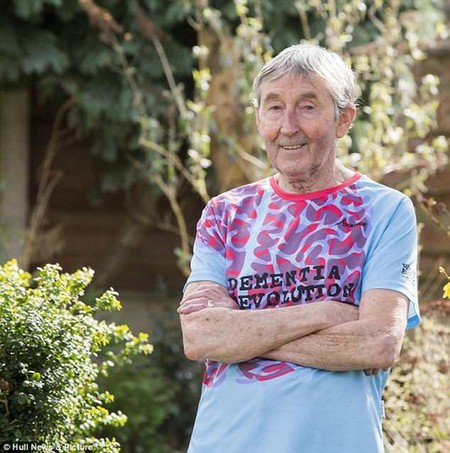Two years ago, Ron’s family began to notice differences in his behaviour. He’d leave his key in the door and he seemed unable to make decisions. ‘He wasn’t the strong, decisive man I’d grown up with,’ says Steven.
‘There seemed to be more and more little notes around the house – writing things down to try to remember them – but nothing seemed to get done, the notes stayed and were added to.’
Ron Hill, 79, once the world’s top marathon man, can tell you the exact time he took to win gold at the Commonwealth Games in Edinburgh in 1970 – two hours and nine minutes.
He was the second man ever to break 2.10 – and he is still revered by elite athletes across the globe. ‘One of the best days of my life!’ he beams. ‘People said: “That pace is suicidal, he’ll never keep it up”. But I had everything under control.
‘I covered ten miles in 38 minutes and I was a bit tired, but my body was working perfectly and I knew I could win, so I put my head down and ran. Coming in first, then clapping the other guys in, it was just marvellous. I’ll never forget it.’
He also remembers the same year when he won the Boston Marathon – the first Briton ever to do so – and he can describe in detail the silver string running vest and ultra-light shoes he designed himself.

Ron Hill, 79, once the world’s top marathon man was the second man ever to break 2.10
But ask him how many grandchildren he has, and he struggles to find the right answer. ‘… One, I think,’ he says uncertainly, leading the way past framed family pictures of his wife, May, and sons, Steven, 54 and Graham, 52, to a study crammed with trophies and memorabilia.
Steven feared his dad might be showing early signs of dementia, so asked him to see his GP for a memory test. Ron would turn up but forget what he’d gone for.
Dementia is the catch-all term for a collection of symptoms – including memory changes – that affect someone’s ability to function in their day-to-day life.
It isn’t a natural part of ageing. It’s a disease that causes physical changes in the brain: as it progresses, the structure and chemistry of the brain changes, and as a result, nerve cells die. Diagnosis is based on a combination of assessments and memory tests that can be done by a GP, a hospital specialist or at a memory clinic.

Last year, when Ron’s memory seemed to be worsening, Steven insisted on going with him to the doctor. ‘Dad told him happily: “I feel great, no problems at all”,’ says Steven.

Runner Ron Hill now (left) and in 1970 (right) after winning the marathon at the Commonwealth Games in Edinburgh
‘That shocked me, because we knew he was getting more and more mixed up and confused. But when the doctor asked Dad to repeat the months of the year backwards, he couldn’t get any further than September. Sat next to him, I could see just how difficult he was finding it, and how out of character that was for him.’
Fuelled by an indomitable spirit, Ron, a textile chemist who set up his own sportswear company, famously ran every day of his life for 52 years, clocking up more than 160,000 miles until a heart problem in 2016 forced him to stop. ‘For Dad to achieve what he did, he had to be determined, very stubborn and completely self-reliant,’ says Steven.
‘Until then he was still driving himself as hard as ever, still obsessed by other people’s race times and keeping a meticulous training diary – to hear him struggle to recount the months of the year felt devastating.’
Runner Ron Hill wears a Dementia Revolution t-shirt now
Ron’s GP referred him to a memory clinic. He also had an MRI scan that showed hardening of the arteries and decreased volume of the hippocampus, which is the area of the brain responsible for memories.
There are more than 100 causes of dementia, but the most common is Alzheimer’s, where abnormal plaques form in the brain, and vascular dementia, which Ron has, when narrowing blood vessels cut blood supply to the brain.
There is currently no cure, but drugs may be used to manage symptoms. Ron takes memantine which helps messages to be transmitted between brain cells.
‘It is very important to see the patient with family because it’s often family members who notice changes in memory first,’ says Ashwin Venkataraman, a consultant old-age psychiatrist who is also involved in research for the UK Dementia Research Institute at Imperial College London.
Ron and his wife on their wedding day
‘While memory problems are the hallmark of dementia, behavioural and psychological symptoms create the most difficulties for carers and loved ones. Problems such as apathy and depression, anxiety and agitation are common.
‘Some people experience feelings of guilt or worthlessness, so feel very down, or they may lash out verbally, or rarely, physically.’
Scientists don’t yet know why some people are affected, but it is thought a combination of age, genes, and lifestyle all play a part.
Dementia affects a staggering one in six over 80s.
The Alzheimer’s Society charity says that one million people will be affected by 2021. ‘Dementia is the biggest health threat facing society,’ says Jeremy Hughes, Alzheimer’s Society CEO. ‘It is now the country’s leading cause of death, ahead of heart disease.’
Ron recalls the first time he suspected he had dementia: ‘I remember getting up one morning, going downstairs and feeling I couldn’t remember anything. It was like a mist coming down. It was quite frightening. I said to May: “I don’t feel too clever… ” I didn’t want to worry her, but I had a good idea what it was.’
He and May are still ‘a strong team’ he says. ‘But I can tell she feels sad because she breaks down. She was crying the other night, saying: “Why has it happened to you? It’s not fair. It should have happened to me.” It’s noble of her, but I’d rather it hadn’t happened to either of us.’
May has noticed a gradual fading away of the old Ron, who, while taking long flights used to spend the time the plane took to refuel running two or three miles on the Tarmac, or running round and round the airport lounge.
‘He’s lost the passion and excitement and enthusiasm for life he used to have,’ she says. ‘I just feel so sad all the time.’
The lunch cruncher
Swap a classic cheese sandwich for a salmon one and you can also add a packet of baked crisps and some raspberries – for fewer calories.
The second lunch also has only 3.4g (17 per cent of your daily limit) of saturated fat, compared to 9.3g (nearly half your daily limit) in the first.
The second lunch is also higher in protein and supplies one of your five-a-day. You can have this or this for a healthy lunc
Ron is looking forward to getting out in the garden, and chopping wood for next winter.
But realistically, he will not do any of these things. He believes he is more or less the same, but is actually doing less and less, and May and their sons are looking after him more and more.
Ron sometimes feels aggrieved when they point things out. ‘Steven has said: “Dad, you’re not functioning properly this morning”, but I will contradict him because I don’t think he’s right. I can’t see that I’m failing in any way.’
Each morning Ron asks May: What day is it today? And: What am I eating today? He sticks doggedly to his old training diet: ‘two scoops of muesli, or poached egg on toast with half a tomato or spinach’.
Although he knows his memory isn’t what it was, he isn’t aware of the progressive decline. ‘I get upset when May is in tears,’ he says. ‘She says it’s not like it used to be. But it’s not like it used to be for me either. It’s disappointing, but I’m hoping to talk her round, to stop her feeling so sad, because it’s not all doom and gloom.’
When Ron was told he had dementia, he says he didn’t feel upset. ‘I knew something was wrong, so I felt I’d already crossed that bridge.’ He believes you can lead a good life post-diagnosis but admits: ‘Sometimes I can be short with May. I get annoyed by little things: “You haven’t drunk your barley water.” “Leave me alone!” ’
‘But on the whole, we’re OK. Everyone thinks I’m forgetting more than I am.’
And he still longs to run: ‘If only I had the time to train, I think I could manage a parkrun.’
Fundamental aspects of Ron’s personality haven’t changed. ‘He’s still the poor boy from Accrington who made good,’ says Steven. ‘He’s still frugal and stubborn and he still wants to do everything his way, just as he always has.’
Ron was always a maverick. He had no trainer or dietitian. He set four world records but often ran locally, for the sheer exhilaration of winning.
Once, when he’d left his running shoes at home, he taped up his feet, ran the Salford Marathon barefoot and broke the course record. But he hardly made a penny from his sport.
‘Three days’ running and the prizes were a pair of single sheets and a picnic hamper,’ he laughs.
‘When I smashed the record for the Boston Marathon, I got a bowl of beef stew.’
Ron is determined not to let his diagnosis get him down. ‘Yes I’ve got dementia,’ he says. ‘I might forget to tell you something, I might be a little bit vaguer than before. But I’m still me, I’m still here, and I want you to treat me as you always did, because I’ve still got life to live – as far as I’m concerned, this race is far from run.’
Ron is supporting the joint Alzheimer’s Research UK and Alzheimer’s Society Dementia Revolution fundraising campaign around the 2019 Virgin London Marathon.



